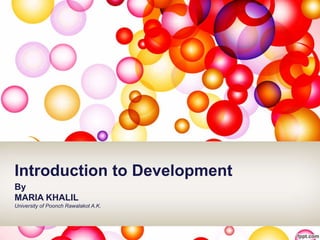
Introduction to Psychological Development Stages
- 1. Introduction to Development By MARIA KHALIL University of Poonch Rawalakot A.K.
- 2. Psychological Development • Psychological development, includes the development of human beings’ cognitive, emotional, intellectual, and social capabilities and functioning over the course of a normal life span, from infancy through old age.
- 3. Infancy • Infancy is the period between birth and the acquisition of language one to two years later. • Newborns are equipped with a predilection for certain visual patterns, including that of the human face, and for certain sounds, including that of the human voice. • Within a few months they are able to identify their mothers by sight, and they show a striking sensitivity to the tones, rhythmic flow, and individual sounds that make up human speech. • Even young infants are capable of complex perceptual judgments involving distance, shape, direction, and depth, and they are soon able to organize their experience by creating categories for objects and events (e.g., people, furniture, food, animals) in the same way older people do.
- 4. Cont… • At about 18 months of age, the child starts trying to solve physical problems by mentally imagining certain events and outcomes rather than through simple trial-and-error experimentation. • New emotional states, including anger, sadness, and fear, all appear by the first year. Infants’ emotional life is centered on the attachments they form to their mothers or other primary caregivers, and through these interactions infants learn to love, trust, and depend on other human beings. • Babies begin to smile at other people beginning at about two months, and their attachments to mothers and caregivers are developed by about six months.
- 5. Childhood • The second major phase in human development, childhood, extends from one or two years of age until the onset of adolescence at age 12 or 13. • Children begin to comprehend words some months before they themselves actually speak. • Infants on average speak their first words by 12–14 months, and by the 18th month they have a speaking vocabulary of about 50 words.
- 6. Cont… • Children begin to use two- and then three-word combinations and progress from simple noun-verb combinations to more grammatically complex sequences, using conjunctions, prepositions, articles, and tenses with growing fluency and accuracy. • By their fourth year most children can speak in adult like sentences and have begun to master the more complex rules of grammar and meaning.
- 7. Cont… • Between the ages of 7 and 12, the beginnings of logic appear in the form of classifications of ideas, an understanding of time and number, and a greater appreciation and other hierarchical relationships. • Emotionally, children develop in the direction of greater self- awareness—i.e., awareness of their own emotional states, characteristics, and potential for action—and they become increasingly able to discern and interpret the emotions of other people as well. • This contributes to empathy, or the ability to appreciate the feelings and perceptions of others and understand their points of view.
- 8. Cont… • These new abilities contribute to children’s moral development, which typically begins in early childhood as concern over and avoidance of acts that attract pain and punishment and progresses to a more general regulation of conduct so as to maintain parental regard and approval.
- 9. Adolescence • Physically, adolescence begins with the onset of puberty at 12 or 13 and culminates at age 19 or 20 in adulthood. • Emotionally, adolescence is the time when individuals learn to control and direct their sex urges and begin to establish their own sexual roles and relationships. • The second decade of life is also a time when individuals lessen their emotional (if not physical) dependence on their parents and develop a mature set of values and responsible self-direction.
- 10. Adulthood • Adulthood is a period of optimum mental functioning when the individual’s intellectual, emotional, and social capabilities are at their peak to meet the demands of career, marriage, and children. • During the middle 30s people develop a sense of time limitation, and previous behavior patterns or beliefs may be given up in favor of new ones. • Middle age is a period of adjustment between the potentialities of the past and the limitations of the future.
- 11. Cont… • In women, dramatic shifts in hormone production lead to the onset of menopause. • Often women whose children have grown or left home experience the “empty-nest syndrome”—feeling unwanted or unneeded. • Individuals accept the limits of their accomplishments and either take satisfaction in them or despair and become anxious over unachieved goals or unrealized aspirations.
- 12. Cont… • During old age, sensory and perceptual skills, muscular strength, and memory tend to diminish, though intelligence does not. • These changes, together with retirement from active employment, tend to make the elderly more dependent on their children or other younger people, both emotionally and physically. • Adulthood, the period in the human lifespan in which full physical and intellectual maturity have been attained. • Adulthood is commonly thought of as beginning at age 20 or 21 years. Middle age, commencing at about 40 years, is followed by old age at about 60 years.